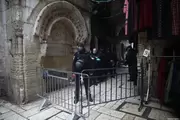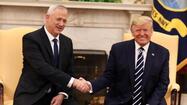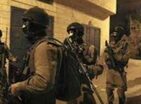4 apr 2020

Israeli forces stand guard at checkpoints in the Old City of Jerusalem, during the coronavirus (Covid-19) pandemic, ahead of the Friday Prayer in Jerusalem on March 20, 2020
In response to a humanitarian appeal launched by the Palestinian Ministry of Health in Gaza to obtain $23 million in urgent aid, in addition to medicine and medical equipment including 250 respirators in order to deal with the coronavirus in the besieged enclave, Israeli Defence Minister Naftali Bennett announced that no humanitarian aid will be allowed into Gaza, until the release of Israeli soldiers, or their remains, captured by the Palestinian resistance movement Hamas.
“There is talk of the humanitarian world in Gaza – Israel also has humanitarian needs, which are mainly the recovery of the fallen,” Bennett disclosed. “I think that we need to enter a broad dialogue about Gaza’s and our humanitarian needs. It would not be right to disconnect these things… and certainly, our hearts would be open to many things,” he added.
Linking the issue of the Israeli soldiers, or remains of soldiers, to the issue of the urgent humanitarian needs for the Gaza Strip related to the fight against the coronavirus, is nothing short of deceptive.
It is nothing more than an attempt by Bennett to paint a glowing image of himself and his country, and convey that they are concerned with humanity, while the Gazan rulers are portrayed as savages due to withholding two, or the remains of two, Israelis in Gaza.
The two Israeli soldiers were captured or killed while they were in their tanks bombing Palestinian homes and killing civilians in 2014, when the 51-day Israeli offensive killed more than 2,260 Palestinians, including more than 400 children and nearly the same number of women, wounding more than 11,000 others.
If two Israeli soldiers are being held by the Palestinians and the Israeli defence minister wanted them to be released on a humanitarian grounds, why did not he release 5,000 Palestinian prisoners living in dire conditions in Israeli jails, including 43 women and girls, 250 boys and over 1,000 patients, with at least 250 suffering from serious conditions?
Several rights groups have warned that the Palestinian prisoners inside Israeli jails are vulnerable to contracting coronavirus, given the overcrowded prisons and bad ventilation, with a severe lack of hygiene. On Thursday, the Israeli Prison Service let out six Palestinian prisoners from Ofer Prison.
They must have contracted the coronavirus because a prisoner from the same prison had been recently released and tested positive for the virus. Rights groups have reiterated several times that Israel is imposing a media blackout regarding the news about the coronavirus among prisoners, in order not to underscore their humanitarian crimes.
Meanwhile, if the Israeli defence minister wanted the release of the Israeli soldiers captured in Gaza on humanitarian grounds, why did he not lift his country’s strict and illegal siege imposed on the Gaza Strip in 2007?
Why did he not look at the number of Palestinians who died due to the lack of medical equipment, proper healthcare and medicine as a result of his country’s siege? Why did he not look at the thousands of Palestinians who are still displaced because they could not rebuild their homes which were destroyed by his army in 2014? Why did he not consider the hundreds of children, mothers and fathers who have been waiting to be reunited with their loved ones who have been imprisoned by his country?
Despite all of this, the Israeli defence minister must know that the Palestinians in the Gaza Strip put all their hostilities with the Israeli occupation aside and provided Israel with millions of medical face masks, while it faces an increasing outbreak of the coronavirus.
Hassan Shehata, owner of a sewing factory in Gaza, told AFP that the Israeli companies sent materials to him, and his factory is to make millions of medical masks for Israel. The owner of another factory in Gaza revealed that he has already signed contracts with Israeli business partners to provide one million masks and 50,000 protective suits by the end of April.
Mr Bennett, we do not want people like you, with the blood of innocent people on their hands, to teach us, the Palestinians, lessons about humanity and morals. Please, do not paint an innocent image of you and your unscrupulous country at the expense of our suffering inflicted by you and your violent state. Enough of your merchandising of humanity on the world, while you remain inhumane.
In response to a humanitarian appeal launched by the Palestinian Ministry of Health in Gaza to obtain $23 million in urgent aid, in addition to medicine and medical equipment including 250 respirators in order to deal with the coronavirus in the besieged enclave, Israeli Defence Minister Naftali Bennett announced that no humanitarian aid will be allowed into Gaza, until the release of Israeli soldiers, or their remains, captured by the Palestinian resistance movement Hamas.
“There is talk of the humanitarian world in Gaza – Israel also has humanitarian needs, which are mainly the recovery of the fallen,” Bennett disclosed. “I think that we need to enter a broad dialogue about Gaza’s and our humanitarian needs. It would not be right to disconnect these things… and certainly, our hearts would be open to many things,” he added.
Linking the issue of the Israeli soldiers, or remains of soldiers, to the issue of the urgent humanitarian needs for the Gaza Strip related to the fight against the coronavirus, is nothing short of deceptive.
It is nothing more than an attempt by Bennett to paint a glowing image of himself and his country, and convey that they are concerned with humanity, while the Gazan rulers are portrayed as savages due to withholding two, or the remains of two, Israelis in Gaza.
The two Israeli soldiers were captured or killed while they were in their tanks bombing Palestinian homes and killing civilians in 2014, when the 51-day Israeli offensive killed more than 2,260 Palestinians, including more than 400 children and nearly the same number of women, wounding more than 11,000 others.
If two Israeli soldiers are being held by the Palestinians and the Israeli defence minister wanted them to be released on a humanitarian grounds, why did not he release 5,000 Palestinian prisoners living in dire conditions in Israeli jails, including 43 women and girls, 250 boys and over 1,000 patients, with at least 250 suffering from serious conditions?
Several rights groups have warned that the Palestinian prisoners inside Israeli jails are vulnerable to contracting coronavirus, given the overcrowded prisons and bad ventilation, with a severe lack of hygiene. On Thursday, the Israeli Prison Service let out six Palestinian prisoners from Ofer Prison.
They must have contracted the coronavirus because a prisoner from the same prison had been recently released and tested positive for the virus. Rights groups have reiterated several times that Israel is imposing a media blackout regarding the news about the coronavirus among prisoners, in order not to underscore their humanitarian crimes.
Meanwhile, if the Israeli defence minister wanted the release of the Israeli soldiers captured in Gaza on humanitarian grounds, why did he not lift his country’s strict and illegal siege imposed on the Gaza Strip in 2007?
Why did he not look at the number of Palestinians who died due to the lack of medical equipment, proper healthcare and medicine as a result of his country’s siege? Why did he not look at the thousands of Palestinians who are still displaced because they could not rebuild their homes which were destroyed by his army in 2014? Why did he not consider the hundreds of children, mothers and fathers who have been waiting to be reunited with their loved ones who have been imprisoned by his country?
Despite all of this, the Israeli defence minister must know that the Palestinians in the Gaza Strip put all their hostilities with the Israeli occupation aside and provided Israel with millions of medical face masks, while it faces an increasing outbreak of the coronavirus.
Hassan Shehata, owner of a sewing factory in Gaza, told AFP that the Israeli companies sent materials to him, and his factory is to make millions of medical masks for Israel. The owner of another factory in Gaza revealed that he has already signed contracts with Israeli business partners to provide one million masks and 50,000 protective suits by the end of April.
Mr Bennett, we do not want people like you, with the blood of innocent people on their hands, to teach us, the Palestinians, lessons about humanity and morals. Please, do not paint an innocent image of you and your unscrupulous country at the expense of our suffering inflicted by you and your violent state. Enough of your merchandising of humanity on the world, while you remain inhumane.
2 apr 2020

The Euro-Mediterranean Human Rights Monitor has denounced Israeli war minister Naftali Bennett for linking any assistance it might offer for the Gaza Strip’s efforts against coronavirus to the issue of the Israeli soldiers being held captive by the Palestinian resistance.
In a statement on Thursday, the Euro-Med Monitor described Bennett’s linking of Gaza’s urgent humanitarian needs to any other issue as an “inhumane act,” calling for keeping the humanitarian issues away from any political calculations.
Euro-Med also called for not using civilians as a means of pressure to achieve gains at the expense of their lives and safety.
In a statement on Thursday, the Euro-Med Monitor described Bennett’s linking of Gaza’s urgent humanitarian needs to any other issue as an “inhumane act,” calling for keeping the humanitarian issues away from any political calculations.
Euro-Med also called for not using civilians as a means of pressure to achieve gains at the expense of their lives and safety.

Palestinian media reports, citing Israeli sources, reported on Thursday that the Israeli government put forth a condition for shipping medical aid to the besieged Gaza Strip, for fighting the Coronavirus (COVID-19) pandemic.
Sources said that Israeli Defense Minister, Naftali Bennett, was quoted during a press briefing in Tel-Aviv, as saying that Israeli officials are considering sending some humanitarian aid to Gaza.
Bennett, however, conditioned this medical aid with the return of two Israeli soldiers who went missing in Gaza in 2014, when Israel carried out a large-scale offensive on the coastal enclave.
According to Reuters News Agency, Bennett stated that various levels of the Israeli government need to get involved in a thorough dialogue over ways to deliver humanitarian medical aid to Gaza, provided that such a dialogue takes into account ‘other inseparable matters’.
Bennett also added that his government will be unlikely to approve the release of Palestinian prisoners, in the near future.
The minister’s remarks came in the context of the spread of Coronavirus, across Israel, including Palestinian prisoners inside Israeli jails, the West Bank and the Gaza Strip.
Israel has been imposing a tight border closure on Gaza, since 2007. Being the occupying power, according to international law, Israel is responsible for the welfare of the population under it’s control.
Back in 2014, Israeli army carried out a large-scale offensive on the besieged Gaza Strip, causing the death of thousands of Palestinians, thousands of injuries, causing widespread devastation of infrastructure and Palestinian homes.
Since then, the ruling Islamist Hamas party in Gaza, have stated that two Israeli soldiers are being held inside Gaza, but have not yet revealed their location.
Spokesperson for the Islamist Hamas party, Hazem Qasem, on Wednesday night, was quoted as saying that ‘Israeli occupation, which continues to besiege the Gaza Strip, must be held responsible for any further spread of Coronavirus across the Gaza Strip’.
He added that the situation in Gaza is getting worse by the day, as the coronavirus pandemic has entered the territory.
Sources said that Israeli Defense Minister, Naftali Bennett, was quoted during a press briefing in Tel-Aviv, as saying that Israeli officials are considering sending some humanitarian aid to Gaza.
Bennett, however, conditioned this medical aid with the return of two Israeli soldiers who went missing in Gaza in 2014, when Israel carried out a large-scale offensive on the coastal enclave.
According to Reuters News Agency, Bennett stated that various levels of the Israeli government need to get involved in a thorough dialogue over ways to deliver humanitarian medical aid to Gaza, provided that such a dialogue takes into account ‘other inseparable matters’.
Bennett also added that his government will be unlikely to approve the release of Palestinian prisoners, in the near future.
The minister’s remarks came in the context of the spread of Coronavirus, across Israel, including Palestinian prisoners inside Israeli jails, the West Bank and the Gaza Strip.
Israel has been imposing a tight border closure on Gaza, since 2007. Being the occupying power, according to international law, Israel is responsible for the welfare of the population under it’s control.
Back in 2014, Israeli army carried out a large-scale offensive on the besieged Gaza Strip, causing the death of thousands of Palestinians, thousands of injuries, causing widespread devastation of infrastructure and Palestinian homes.
Since then, the ruling Islamist Hamas party in Gaza, have stated that two Israeli soldiers are being held inside Gaza, but have not yet revealed their location.
Spokesperson for the Islamist Hamas party, Hazem Qasem, on Wednesday night, was quoted as saying that ‘Israeli occupation, which continues to besiege the Gaza Strip, must be held responsible for any further spread of Coronavirus across the Gaza Strip’.
He added that the situation in Gaza is getting worse by the day, as the coronavirus pandemic has entered the territory.
26 feb 2020

In a massive event held in the southern city of Be'er Sheva, the relatives of fallen IDF soldiers Oron Shaul and Hadar Goldin, as well as mentally ill Israeli citizen Avera Mengistu, beg the government to return them from Hamas's captivity
Some 8,000 people attended a rally in the southern city of Be'er Sheva on Wednesday evening, calling for an Israeli citizen and the bodies of two IDF soldiers killed in a war six years ago to be returned.
Hamas has been holding the bodies of IDF soldiers Oron Shaul and Hadar Goldin since 2014, when they fell in combat during Operation Protective Edge. Along with the bodies of the two soldiers, Hamas is also holding Avera Mengistu and Hisham al-Sayed - two Israeli citizens who crossed into Gaza in 2014 and 2015 due to suffering from a mental illness.
The event was held at an outdoor amphitheater in the city and attended by members of various organizations fighting for the cause as well as representatives of bereaved families, prominent business people and popular Israeli musicians.
Among the main speakers were the parents of Goldin, a brother of Shaul as well as the brother of the Ethiopian-Israeli citizen.
"Is there anyone here who can explain to me why thousands of Gazans are entering Israel for work, while my son is still in Gaza?” said Simha Goldin, the fallen soldier’s son. “Can anyone explain to me why Israel is helping to build hospitals for Hamas, while Avera Mengistu has not taken his medication in five and a half years?" he added.
Ilan Mengistu, Avera’s brother, implied racism is behind Israeli government’s inaction in bringing back the mentally ill young man.
"This Friday, it will be 2000 days since Avera has been seized by Hamas,” he said. “Would they have treated a child with a different skin color another way?” A child from Caesarea? The country would have turned on its head to bring him home,” he said.
“Unfortunately, Avera is Ethiopian and is therefore transparent,” he said, adding, “Likud, only Likud,” which might have been a sarcastic call to vote for the ruling party in the coming elections.
Some 8,000 people attended a rally in the southern city of Be'er Sheva on Wednesday evening, calling for an Israeli citizen and the bodies of two IDF soldiers killed in a war six years ago to be returned.
Hamas has been holding the bodies of IDF soldiers Oron Shaul and Hadar Goldin since 2014, when they fell in combat during Operation Protective Edge. Along with the bodies of the two soldiers, Hamas is also holding Avera Mengistu and Hisham al-Sayed - two Israeli citizens who crossed into Gaza in 2014 and 2015 due to suffering from a mental illness.
The event was held at an outdoor amphitheater in the city and attended by members of various organizations fighting for the cause as well as representatives of bereaved families, prominent business people and popular Israeli musicians.
Among the main speakers were the parents of Goldin, a brother of Shaul as well as the brother of the Ethiopian-Israeli citizen.
"Is there anyone here who can explain to me why thousands of Gazans are entering Israel for work, while my son is still in Gaza?” said Simha Goldin, the fallen soldier’s son. “Can anyone explain to me why Israel is helping to build hospitals for Hamas, while Avera Mengistu has not taken his medication in five and a half years?" he added.
Ilan Mengistu, Avera’s brother, implied racism is behind Israeli government’s inaction in bringing back the mentally ill young man.
"This Friday, it will be 2000 days since Avera has been seized by Hamas,” he said. “Would they have treated a child with a different skin color another way?” A child from Caesarea? The country would have turned on its head to bring him home,” he said.
“Unfortunately, Avera is Ethiopian and is therefore transparent,” he said, adding, “Likud, only Likud,” which might have been a sarcastic call to vote for the ruling party in the coming elections.
27 jan 2020

Former IDF chief calls for shared dialogue with Palestinians and neighboring countries; suggests release of Israeli captives in Gaza should be included in peace plan
Blue & White Chairman Benny Gantz said on Monday that he will work to implement Trump's peace plan for the Middle East immediately after the elections in March.
"The president's peace plan is a significant and historic milestone, indeed," Gantz told reporters at his Washington hotel after his meeting with Trump. "Immediately after the elections, I will work toward implementing it from within a stable functioning Israeli government, in tandem with other countries in our region."
Gantz said he and Trump discussed "matters of the utmost importance to Israel's future and security," but he would not disclose any further details for the time being.
"During the meeting, we talked about the importance of a shared dialogue with the Palestinians, the other countries in the region and Jordanian King Abdullah II," said Gantz.
Gantz thanked Trump for his "deep support and for the citizens and security of Israel, especially with the U.S. assistance against the Iranian threat and its proxies, recognizing Israeli sovereignty over the Golan Heights and moving the American embassy to Jerusalem."
The former IDF chief said that he emphasized the issue of the Israelis held in Hamas captivity in the Gaza Strip, stressing that their release should be included in the plan.
Gantz also addressed Netanyahu's bid to score parliamentary immunity from graft charges he faces, which will be discussed on Tuesday at the Knesset plenum.
"No one has the right to lead an entire country at such complex times, both politically and security-wise, while he's completely dedicated to his personal interests."
U.S. Vice President Mike Pence, U.S. Secretary of State Mike Pompeo and U.S. National Security Advisor Robert O'Brien were also present at the meeting.
After meeting with Prime Minister Benjamin Netanyahu earlier Monday, Trump announced he will officially publish the plan's details on Tuesday.
Blue & White Chairman Benny Gantz said on Monday that he will work to implement Trump's peace plan for the Middle East immediately after the elections in March.
"The president's peace plan is a significant and historic milestone, indeed," Gantz told reporters at his Washington hotel after his meeting with Trump. "Immediately after the elections, I will work toward implementing it from within a stable functioning Israeli government, in tandem with other countries in our region."
Gantz said he and Trump discussed "matters of the utmost importance to Israel's future and security," but he would not disclose any further details for the time being.
"During the meeting, we talked about the importance of a shared dialogue with the Palestinians, the other countries in the region and Jordanian King Abdullah II," said Gantz.
Gantz thanked Trump for his "deep support and for the citizens and security of Israel, especially with the U.S. assistance against the Iranian threat and its proxies, recognizing Israeli sovereignty over the Golan Heights and moving the American embassy to Jerusalem."
The former IDF chief said that he emphasized the issue of the Israelis held in Hamas captivity in the Gaza Strip, stressing that their release should be included in the plan.
Gantz also addressed Netanyahu's bid to score parliamentary immunity from graft charges he faces, which will be discussed on Tuesday at the Knesset plenum.
"No one has the right to lead an entire country at such complex times, both politically and security-wise, while he's completely dedicated to his personal interests."
U.S. Vice President Mike Pence, U.S. Secretary of State Mike Pompeo and U.S. National Security Advisor Robert O'Brien were also present at the meeting.
After meeting with Prime Minister Benjamin Netanyahu earlier Monday, Trump announced he will officially publish the plan's details on Tuesday.
7 jan 2020

The two longest-serving Palestinian prisoners in Israeli jails, cousins Karim and Maher Younis, have been behind bars for 38 years, on Monday, the Palestinian News and Info Agency reported.
Palestinian Prisoner Society (PPS) said that the two, along with 24 other prisoners, were supposed to have been released in 2014 in a deal struck with Israel, negotiated by former US Secretary of State John Kerry.
However, Israel has reneged on that deal and kept the prisoners, all from occupied Jerusalem or inside Israel, in prison.
Karim Younis was born on November 23, 1958, in the town of Ara inside Israel. He is the eldest son of his family. Younis was arrested on January 6, 1983 and was sentenced to life in prison and later set to a period of 40 years.
Maher Younis, Karim’s cousin, was born on January 6, 1958. He is also from the village of Ara and from a family of five sisters and one brother. He was arrested on January 18, 1983 and sentenced to life in prison, also later set to 40 years.
Other long serving Palestinian prisoners, according to the PPS, include Bashir al-Khatib, who has been in jail for 33 years. He was born on April 20, 1961, he is from the city of Ramle, inside Israel, and he is the father of five children.
Nasser Srour and Mahmoud Srour, from Bethlehem in the occupied West Bank, have been in jail for 28 years. Nasser was born on November 16, 1969 and arrested on January 4, 1993. Mahmoud was born on January 27, 1970 and was arrested on January 5, 1993.
(pre Oslo release 2013)
Palestinian Prisoner Society (PPS) said that the two, along with 24 other prisoners, were supposed to have been released in 2014 in a deal struck with Israel, negotiated by former US Secretary of State John Kerry.
However, Israel has reneged on that deal and kept the prisoners, all from occupied Jerusalem or inside Israel, in prison.
Karim Younis was born on November 23, 1958, in the town of Ara inside Israel. He is the eldest son of his family. Younis was arrested on January 6, 1983 and was sentenced to life in prison and later set to a period of 40 years.
Maher Younis, Karim’s cousin, was born on January 6, 1958. He is also from the village of Ara and from a family of five sisters and one brother. He was arrested on January 18, 1983 and sentenced to life in prison, also later set to 40 years.
Other long serving Palestinian prisoners, according to the PPS, include Bashir al-Khatib, who has been in jail for 33 years. He was born on April 20, 1961, he is from the city of Ramle, inside Israel, and he is the father of five children.
Nasser Srour and Mahmoud Srour, from Bethlehem in the occupied West Bank, have been in jail for 28 years. Nasser was born on November 16, 1969 and arrested on January 4, 1993. Mahmoud was born on January 27, 1970 and was arrested on January 5, 1993.
(pre Oslo release 2013)
Page: 2 - 1
SWAP - A - B - C - D - E - F - G - H - I - J - K - L - M - N - O - P - Q - R - S - T - U - V - W - X - Y - Z
